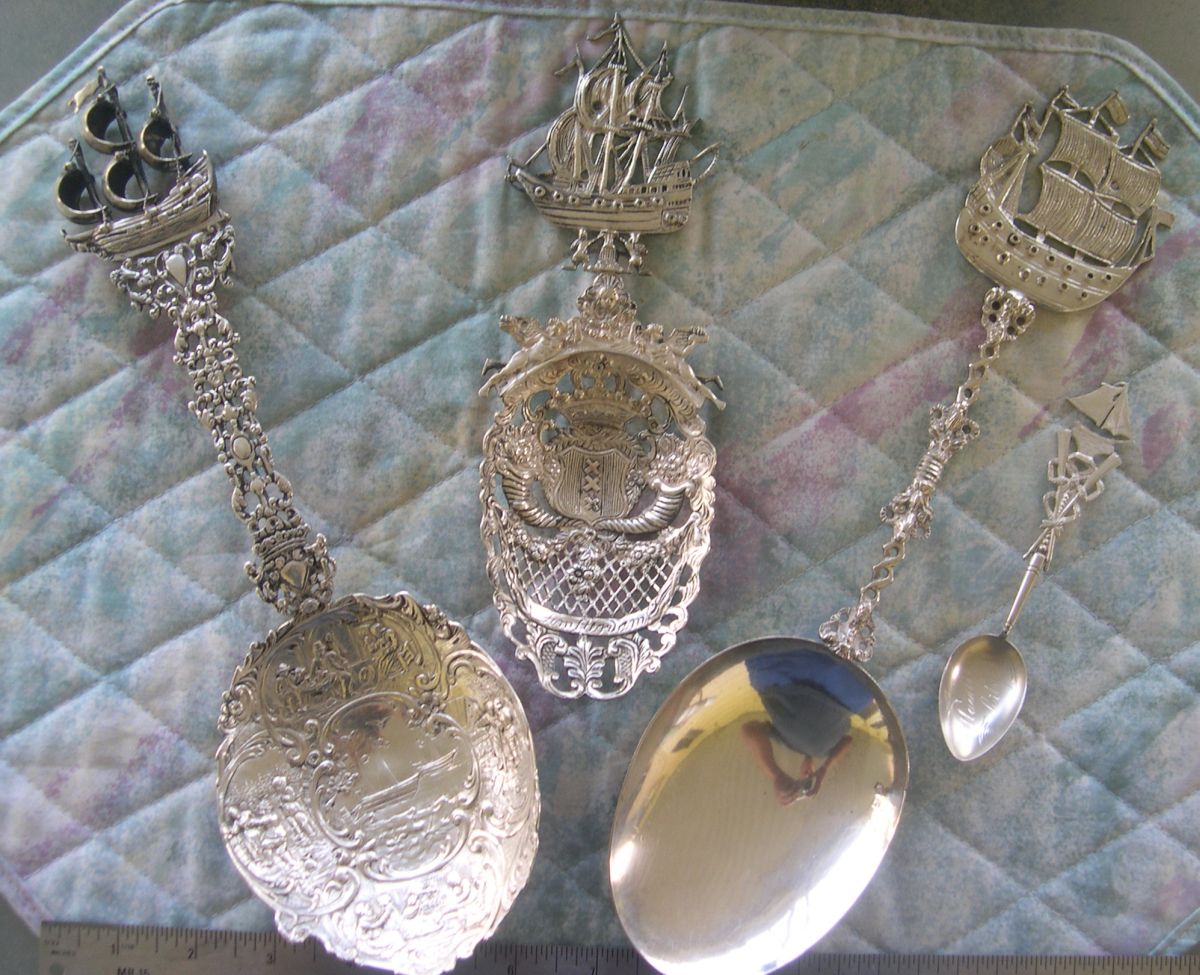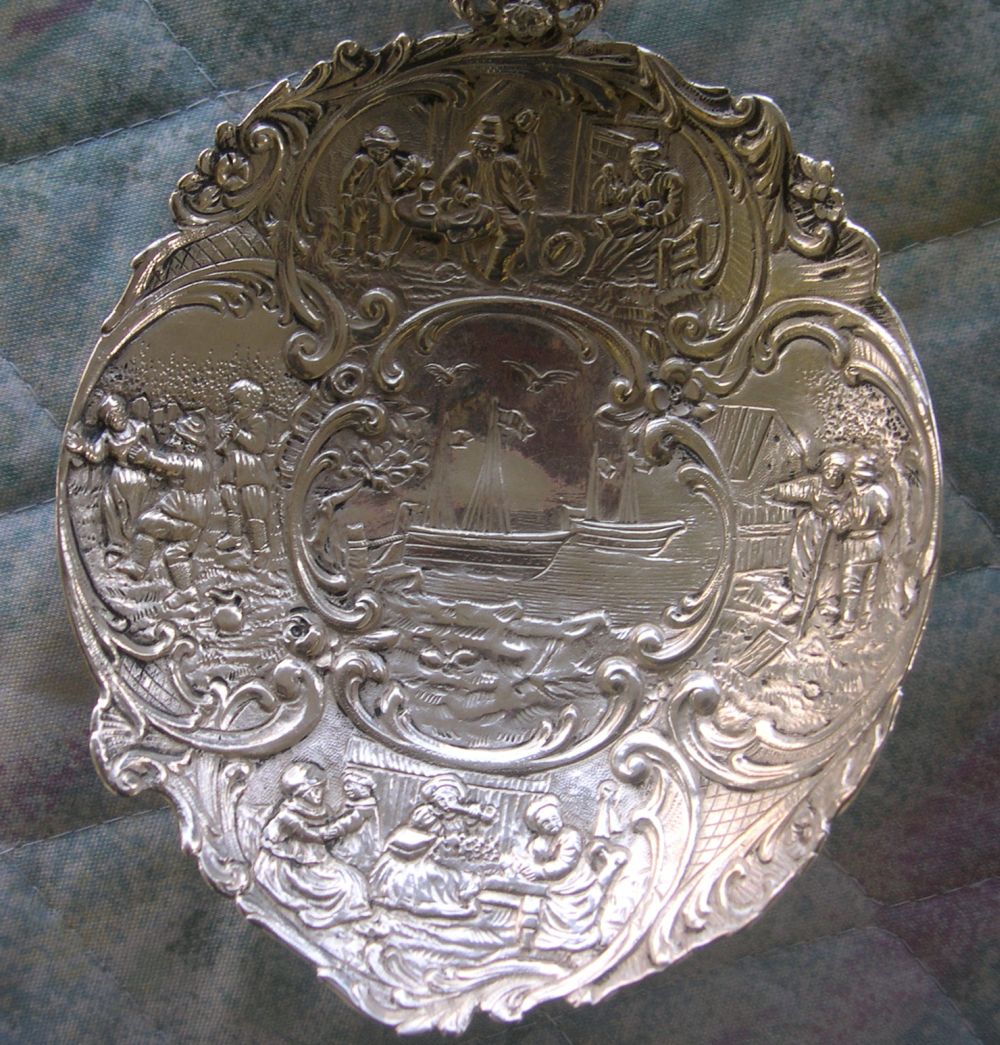These spoons are not your typical souvenir spoon. They are very large and heavy and were made for display purposes.
Most of the spoons are of Dutch or Germanic origin (Hanau or Schoonhaven) and are made of various silver purities. They were often made in a Victorian style which freely combined
different silver styles into the same piece. Thus it would not be unusual to see Rococco and Art Nouveau and other elements in the same spoon.
In the Northern provinces of Europe, fine art painters tried to evoke spectator emotions. Even the genre type paintings which seem to only
depict 'every day life' were either to emphasize a proverb or saying or to impart a moralistic idea. You will see these concepts repeated in
many of the spoons in this series of exibits.
Furthermore you will see a number of examples of the auricular (lobate) style of ornamental decoration using softly flowing abstract shapes or stylized forms or ambiguous masks and
shapes which seem to emerge from molten silver.
I suspect that these spoons were purchased or commissioned by people who were invested in shipping ventures.
These spoons are large and heavy and contain a lot of silver, so they would have been expensive.
Shipping was really the first type of corporation wherein people pooled
their money to purchase and supply a ship. Upon its return the profits would be split according to the percentage of ownership.
Shipping was also a very high risk speculation as ships might take years to reach a destination and return and many never did return.
The sailors and officers who manned the ship also worked on a percentage and they were not paid until the ship returned home and the cargo was sold.
Most of these spoons were made in the late 19th century or early 20th century. The styling often seems to indicate that they came from a former time period.
The idea of using a large ship on a spoon is derived from the custom of having a huge silver and gold and jeweled nef as the centerpiece of the dining table.
This type of awesome silversmith work was used by the European kings and nobles during the 1500-1650 era.

Example of an elaborate late era silver and gilt nef
Many nefs are on display in various museums around the world

In this first picture, I have included a ruler so that you can better understand the size of these spoons. In addition the smaller spoon on the right is a normal size teaspoon and you can see
how these spoons simply dwarf this normal sized spoon.
1. This spoon is 12" long and has a bowl which is 4" wide. three untraced marks, unknown quality (prob 800) silver
2. This Amsterdam spoon is 8.75" long and is 3" wide at the widest point (angel legs), Dutch key/lion mark used from 1853-1953 (export mark), other unidentified marks, 835 silver
3. This spoon is 12.5" long and has a bowl that is 3.25" wide. Dutch, 835 silver

This bowl has a lot of allegory. First notice the 'C' delininations from the Art Nouveau style and the auricular styling throughout.
The center picture shows two boats with stylized water, birds etc.
The top picture has a man next to a table which has drinking cups, a boy and a woman cradling a child and holding a doll. There is a hat on the wall and books in a bookshelf
The right side picture has two men talking and pointing to a farm type building
The bottom picture has two men at a table and one is smoking a pipe. The woman is talking to a child.
The left picture has two people dancing while a third is playing a musical instrument (flute?)
The amount of surrounding decoration is extensive and more in the Rococo manner but using the art nouveau style

The finial is a large three masted sailing ship
The handle is heavily decorated and at the bottom are two puttis playing musical instruments

This bowl indicates that the spoon was from Amsterdam and shipping was a very important part of the city's business.
The coat of arms is crowned.
At the center you will see cornucopia horns as everyone hoped to make a lot of money from the sale of the cargo
At the top there are two naked male winged angels who would hopefully guide the ship safely (moralistic element)

A smaller looking ship which is supported by two winged angels

A four masted ship with five different flags.
Click to see the next huge spoon exhibit (spoon/fork sets)
Return to ships spoons exhibits
Return to spoon exhibits index